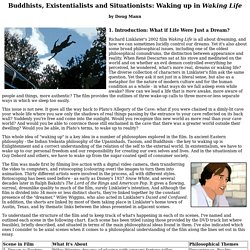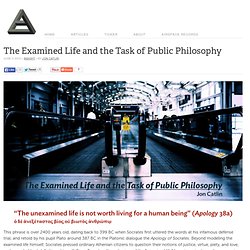

Waking Essay. Buddhists, Existentialists and Situationists: Waking up in Waking Life by Doug Mann 1.

Introduction: What if Life Were Just a Dream? Richard Linklater's 2002 film Waking Life is all about dreaming, and how we can sometimes lucidly control our dreams. Yet it's also about some broad philosophical issues, including one of the oldest philosophical conundrums, the distinction between appearance and reality. This issue is not new. This whole idea of "waking up" is a key idea in a number of philosophies explored in the film.
The film was made first by filming live action with a digital video camera, then transferring the video to computers, and rotoscoping (colouring over) the images to turn them into animation. To understand the structure of the film and to keep track of what's happening in each of its scenes, I've named and outlined each scene in the following chart. As I've said, the central issue in the film is dreaming. 2. We see these ideas in several scenes. 3. Intro to the Philosophy of Politics and Economics. Born to Learn. Sartre, Heidegger, Nietzsche: Three Philosophers in Three Hours. Surprising Reality Behind What Motivates Us. @Blueluck: Very true - I've seen other countries where people leave their family in another country to go find work, and then to manual labor for extremely cheap just to be able to send it all home to their family.

I guess that could be interpreted as their purpose, but the work is not purposeful in and of itself. I guess "pay enough to take money off the table" covers that, so we're only talking about how to motivate people after they're at the comfortable level most Americans that read this blog are at. Interesting results in India, though. I believe there is a threshold that once you're paid a certain amount, you feel on top of things like you deserve it, so you don't work hard to move up further. If you take money completely off the table, or put the carrot completely away, there's not much to work for anymore. I think that's one reason government employees aren't known for super service. @Blueluck: Its completely subjective, is the answer. WHERE GOOD IDEAS COME FROM.
Id, Ego, & Superego. The Crises of Capitalism. Athene's Theory of Everything. Stoned Ape Theory. It "Could" Just Be Coincidence. God vs. Logic. Monty Python - Philosophers' World Cup. Useful, Lucid, Informative & Wise. Escape from Planet of the Apes - Mindfu*k.
TED. 60-second adventures. 3 Minute Philosophy. ALAN WATTS FOR THE WIN. The Examined Life & the Task of Public Philosophy. This phrase is over 2400 years old, dating back to 399 BC when Socrates first uttered the words at his infamous defense trial, and retold by his pupil Plato around 387 BC in the Platonic dialogue the Apology of Socrates.

Beyond modeling the examined life himself, Socrates pressed ordinary Athenian citizens to question their notions of justice, virtue, piety, and love, and never held set definitions himself. Since Socrates, the aphorism of the “examined life” has given rise to analogous sayings such as “life of the mind,” vita contemplativa, and “learning for learning’s sake,” and is the subject of countless books and courses. One could even consider the project of philosophy, which itself began with Socrates, one of calling this phrase into question. But the examined life, as fundamental to human life as it was for Socrates, has never been available for all human beings. As theoretical as Socrates’s philosophy can seem, it was always a practical, public project at heart.